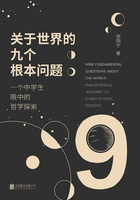
Ⅱ.The Compromise of The New Phyrronism
Fogelin thinks that correspondence theory and Davidson's theory are unsuccessful, and puts forward a viewpoint of Phyrronism. In the second section, I will introduce the response of Phyrronism to the problem of knowledge justification and point out a reason for not accepting it.
Phyrronism believes that the questioning of knowledge will eventually fall into Agrippa's Five Modes, so all attempts to build a knowledge system are just attempts with no future. People's challenges to correspondence theory and skepticism seem to contain their failures (let's assume this for a moment). Empiricus clearly pointed out that the goal of Phyrronism lies in transcending this debate on the level of epistemology and achieving inner peace. When people put down their inquiry about knowledge, return to their daily beliefs and lead a normal life, Phyrronism thinks that people have gained a kind of peaceful happiness instead.
Phyrronism does not advocate that people should live passively or face the embarrassing reality of knowledge in despair. On the contrary, what a good Phyrronist does is just a suspension of beliefs. This suspension of beliefs is not contradictory to normal life. A Phyrronist can still eat meals,sleep, live, entertain himself, read, etc. contentedly, but he is not obsessed with knowledge. The Phyrronist is satisfied only with the grasp of behavior itself in life.
Wittgenstein has a similar expression in On Certainty . Wittgenstein pointed out that although we can have the most thorough doubts and reflections on knowledge, it is inevitable for us to carry out our daily behaviors. And these behaviors must be grounded in some ways. The reason why people can live and act normally is not that there are some unquestionable and absolutely certain factors in these things, but that people will suspend their doubts when they live and act. For example, when we walk into the classroom and see the blackboard, no one will doubt what if the blackboard is just an illusion constructed by the brain in a vat, but we will only regard the blackboard as the basis of behavior.
However, not everyone needs to accept the Phyrronism attitude towards life. Dreyfus and Charles Taylor pointed out in Retrieving Realism that people have an innate curiosity and will, which drives them to ask questions about knowledge and to try to acquire effective knowledge free from doubt. For these questioners, the establishment of a reliable knowledge system is necessary.
The purpose of this challenge is not to refute the legitimacy of the skepticism of Phyrronism, but only to show that not everyone should accept Pyrrho's dogma. In other words, people can choose to accept the peace brought by Phyrronism. However, people also have equally convincing reasons to ask and explore a reliable epistemology system.